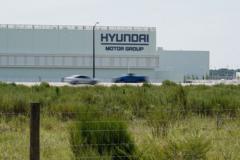Is Hyundai Delaying the Opening of Its Raided Plant?

Published: 2025-09-11 18:00:11 | Category: technology
This article explores the implications of a recent immigration raid at a Hyundai plant in Georgia, which has delayed the factory's opening by at least two months. The raid, the largest in US history, has sparked tensions between the US and South Korea, with significant concerns over foreign investment and worker rights.
Last updated: 20 October 2023 (BST)
Key Takeaways
- The immigration raid at Hyundai's Georgia plant has led to a two to three-month delay in its opening.
- 475 individuals were detained, including around 300 South Korean workers, raising diplomatic tensions.
- The incident has cast doubt on the viability of a recent US-South Korea trade deal.
- Hyundai's CEO has confirmed the company is working to fill the vacant positions left by the detained workers.
- South Korean officials have expressed concerns about the impact on foreign investments in the US.
Background of the Immigration Raid
The raid took place at a Hyundai plant that is part of a larger complex in Georgia, which is expected to create approximately 8,500 jobs. The plant's opening was highly anticipated, and the timing of the raid has raised significant concerns about labour rights and the future of foreign investment in the US.
The US Immigration and Customs Enforcement (ICE) agency conducted the operation, which resulted in the detention of 475 individuals. This number represents a historic high for a single immigration enforcement action, highlighting the current climate surrounding immigration policies in the United States.
Impact on Hyundai and South Korean Workers
Hyundai's CEO, José Muñoz, stated that the raid would cause a "minimum two to three months delay" in the factory's opening. Many of the detained workers were in the US under temporary arrangements to assist with the plant's launch. Their sudden detention has left the company scrambling to fill key positions as these workers prepare to return to South Korea.
According to reports, all but one of the detained workers declined an offer from the US government to remain in the country for further training of American workers. This reluctance illustrates the workers' desire to return to their home country after the distressing experience of the raid.
Political Repercussions and Diplomatic Tensions
The raid has escalated tensions between the US and South Korea, with South Korean President Yoon Suk-yeol voicing concerns that such actions could deter foreign investment. The president warned that if foreign workers are not permitted to assist in factory operations, it would complicate the establishment of new factories in the US.
This incident comes at a critical time, as the US and South Korea had recently agreed to a trade deal that aimed to bolster economic ties. The deal involved promises of significant investment, including Hyundai's pledge of £19.2 billion ($26 billion) for various projects, including a new steel factory in Louisiana. The potential fallout from the raid raises questions about the future of such agreements and the willingness of companies to invest in the US.
Reactions from Companies and Economic Analysts
LG Energy Solution, which operates a battery plant in collaboration with Hyundai, stated that many of its detained employees were in the US on various types of visas or under a visa waiver programme. This highlights the complex nature of immigration and employment practices within the industry.
Economic analysts have voiced concerns over the long-term implications of the raid. If the US continues to adopt stringent immigration policies, it may dissuade foreign companies from investing in US manufacturing. This could hinder economic growth and job creation in a country that relies on foreign investment for its industrial sector.
What Happens Next?
As the situation unfolds, Hyundai and other companies will need to adapt to the repercussions of the raid. The immediate challenge is to determine how to fill the vacancies left by the returning workers. This may involve looking for local talent or exploring other solutions to ensure that the factory can operate as planned.
Moreover, South Korean officials are likely to continue advocating for the rights of their citizens and may seek diplomatic avenues to address the fallout from the raid. The broader impact on US-South Korea relations remains to be seen, as both nations navigate the complexities of immigration policy and foreign investment.
Conclusion: The Bigger Picture
The immigration raid at Hyundai's Georgia plant serves as a reminder of the intricate relationship between immigration policy and economic development. As tensions rise between the US and South Korea, both countries must consider the implications of such enforcement actions on international investment and labour practices. The future of economic cooperation will depend on how effectively these issues are addressed in the coming months.
As we watch this situation develop, it raises important questions about the balance between national security and the need for skilled labour in a globalised economy. How will companies navigate these challenges in the future? #Hyundai #ImmigrationPolicy #ForeignInvestment
FAQs
What caused the delay in Hyundai's factory opening?
The delay was caused by a massive immigration raid that resulted in the detention of 475 people, including many South Korean workers who were helping to launch the factory.
How many workers were detained during the raid?
A total of 475 individuals were detained during the raid, with roughly 300 of them being from South Korea.
What are the implications of the raid for US-South Korea relations?
The raid has raised concerns about the future of foreign investment in the US, with South Korean officials warning it may discourage companies from establishing operations in the country.
What is Hyundai's response to the situation?
Hyundai's CEO stated they are working to find ways to fill the positions left by the detained workers and are assessing the impact of the raid on the factory's opening timeline.
What actions are South Korean officials taking regarding the detained workers?
South Korean officials have called for their citizens' rights to be respected and are advocating for the resolution of issues arising from the raid.



